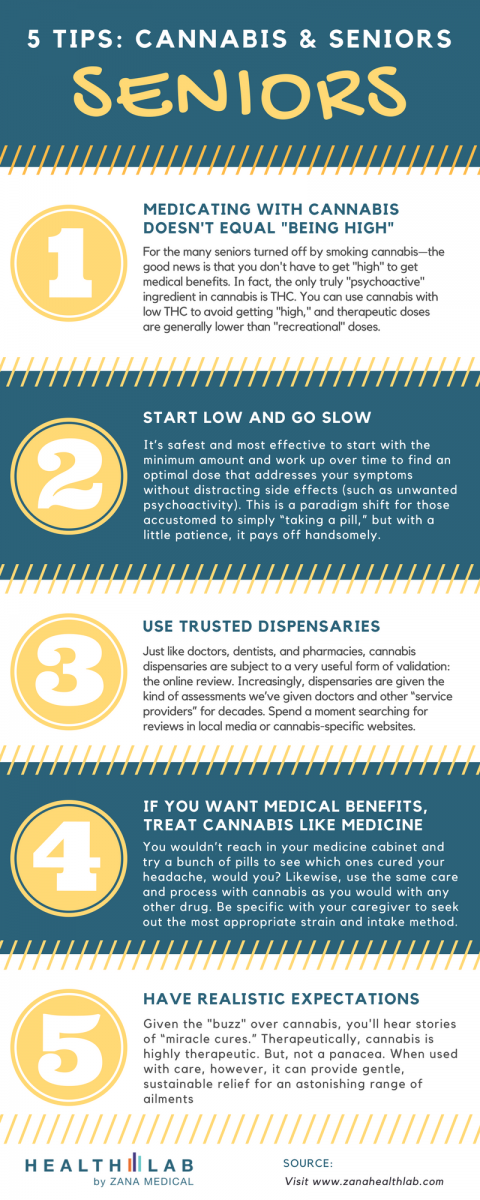Tips for Seniors: Getting Started
“Grandma got stoned!” is one of the oldest punchlines in drug humor, but with the wave of legalization picking up momentum, seniors and their caretakers are taking a sober look at cannabis’ potential, and finding a lot to celebrate. Compared with many of the pharmaceuticals commonly prescribed for chronic symptoms and conditions, cannabis offers a gentler, more effective and objectively safer alternative.
Consider the example of Lucy Hanson, a vibrant, social 93-year-old living in an assisted care facility in Southern California. Several years ago, a cascading panoply of prescriptions left her so disabled that she was diagnosed with severe dementia, and seemingly in the very end stages of life.
Fortunately, a perceptive and open-minded caregiver suggested clinical cannabis, and the turnaround was nothing short of miraculous. What’s more, you can hear the fully recovered (and sharp as a tack) Lucy tell her own story in Eyes Wide Open, a podcast on clinical cannabis and insomnia.
But if cannabis is finding broad application for an astonishing number of maladies, there’s an equal amount of questionable uses—and objectively bad advice—to be found. Complicating the problem is the fact that many clinicians—hamstrung by legal and cultural prohibitions—are scrambling to educate themselves in the field of cannabis medicine. Add to this the sudden availability of legal cannabis in many states, and the result is a real quandary: A large and hopeful population of seniors anxious to try cannabis, a glut of retailers—many of whom have little or no familiarity with seniors’ conditions and concerns—and few sources for reliable, validated guidance and advice.
Cannabis & Seniors: 5 Tips
How do you cut through the noise to find the nuggets? Everyone comes with their own unique physiology and medical history, but there are a few basic guidelines that can benefit seniors—or anyone else—as they begin to navigate this promising, but confusing landscape:
1. Cannabis doesn’t equal “being high.”
For the many seniors turned off by smoking cannabis—whether for the impact on lungs, the cultural stigma, or simply the psychoactivity—the good news is that inhalation is only one of many ways to access cannabis medicine. A knowledgeable dispensary clerk (or “budtender”) will guide you towards other intake methods or cannabis products with little to no psychoactivity at all.
2. Start low and go slow.
Cannabis occupies a difficult middle ground: Is it medicine? Is it a recreational product? When using cannabis to treat clinical conditions, it’s safest and most effective to start with the minimum amount and work up over time to find an optimal dose that addresses your symptoms without distracting side effects (such as unwanted psychoactivity). This is a paradigm shift for those accustomed to simply “taking a pill,” but with a little patience, it pays off handsomely.
3. Use trusted sources and dispensaries.
Obviously, a recommendation from a trusted caregiver or friend is best, but there are other sources of information. Cannabis retail may be a new industry, but it’s still subject to a very old—and very useful—form of validation: The online review. Increasingly, dispensaries are given the kind of assessments we’ve given doctors and other “service providers” for decades. Spending a moment searching for reviews in local media or cannabis-specific websites takes much of the guesswork out of finding safe, well-stocked and well-informed dispensaries.
4. If you want cannabis’ medical benefits, treat it like medicine.
You wouldn’t reach in your medicine cabinet and try a bunch of pills to see which ones cured your headache, would you? In other words, use the same care and process with cannabis as you would with any other drug. Be specific with your caregiver and budtender; spending the time to seek out the most appropriate strain and intake method for your condition will reap rewards by reducing or even eliminating the “error” in “trial and error.”
5. Have realistic expectations.
Given the, well, buzz over cannabis, it’s inevitable that stories of “miracle cures” make the rounds, especially among those dealing with chronic, debilitating symptoms and diseases. No, cannabis will not cure cancer—yet—but when used with care, it can provide gentle, sustainable relief for an astonishing range of ailments.
Cannabis offers great promise, but harnessing its medical potential takes a little planning and forethought. Prepare yourself first and foremost by gathering reliable, authoritative information, both on cannabis as medicine and on local providers in your area. And if you’re a senior still on the fence, take heart in the numbers: Older Americans are far and away the fastest-growing segment of the population to embrace cannabis, showing a whopping 455% increase since 2002. Cannabis may not be for everyone, but more and more of us are using it to find real relief.


